
William Seward Burroughs II was an American writer and visual artist. He is widely considered a primary figure of the Beat Generation and a major postmodern author who influenced popular culture and literature. Burroughs wrote 18 novels and novellas, six collections of short stories, and four collections of essays. Five books of his interviews and correspondences have also been published. He was initially briefly known by the pen name William Lee. He also collaborated on projects and recordings with numerous performers and musicians, made many appearances in films, and created and exhibited thousands of visual artworks, including his celebrated "shotgun art".
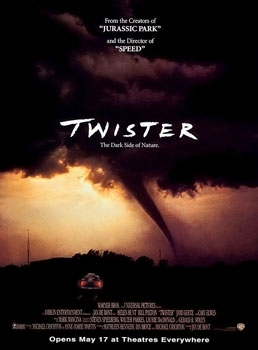
Twister is a 1996 American disaster film directed by Jan de Bont, and written by Michael Crichton and Anne-Marie Martin. It was produced by Crichton, Kathleen Kennedy, and Ian Bryce, with Steven Spielberg, Walter Parkes, Laurie MacDonald, and Gerald R. Molen serving as executive producers. The film stars an ensemble cast that includes Helen Hunt, Bill Paxton, Jami Gertz, and Cary Elwes. It follows a group of storm chasers trying to deploy a tornado research device during a severe outbreak in Oklahoma.

William Paxton was an American actor and filmmaker. He starred in films such as Aliens (1986), Near Dark (1987), Tombstone (1993), True Lies (1994), Apollo 13 (1995), Twister (1996), Titanic (1997), Mighty Joe Young (1998), and A Simple Plan (1998). He had supporting roles in Weird Science (1985), Edge of Tomorrow (2014), and Nightcrawler (2014).

Naked Lunch is a 1991 surrealist science fiction drama film written and directed by David Cronenberg and starring Peter Weller, Judy Davis, Ian Holm, and Roy Scheider. It is an adaptation of William S. Burroughs's 1959 novel Naked Lunch, and an international co-production of Canada, Britain, and Japan.
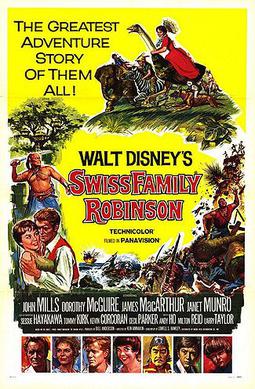
Swiss Family Robinson is a 1960 American adventure film starring John Mills, Dorothy McGuire, James MacArthur, Janet Munro, Tommy Kirk, and Kevin Corcoran in a tale of a shipwrecked family building an island home. It was the second feature film based on the 1812 novel The Swiss Family Robinson by Johann David Wyss, a previous adaptation having been released by RKO Pictures in 1940. Directed by Ken Annakin and shot in Tobago and Pinewood Studios outside London, it was the first widescreen Walt Disney Pictures film shot with Panavision lenses; when shooting in widescreen, Disney had almost always used a matted wide screen or filmed in CinemaScope.

The Keep is a 1983 supernatural horror film written and directed by Michael Mann and starring Scott Glenn, Gabriel Byrne, Jürgen Prochnow, Alberta Watson, and Ian McKellen. Set in Romania during World War II, it follows a group of Nazi soldiers who unleash a malevolent supernatural force after setting up camp in an ancient stone fortress in the Carpathian Mountains. It is an adaptation of the 1981 novel of the same title by American writer F. Paul Wilson. The musical score was composed by Tangerine Dream.
A re-cut trailer, or retrailer, is a mashup video that uses footage from a movie or its original trailers to create a completely new context, or one different from the original source material. The mashups are parody trailers that derive humor from misrepresenting original films: for instance, a film with a murderous plot is made to look like a comedy, or vice versa. They became popular on the Internet in 2005.

Body Melt is a 1993 Australian independent science fiction black comedy body horror film directed by Philip Brophy and written by Brophy and Rod Bishop. Brophy and Bishop are ex-members of the art punk group → ↑ →. The pair also composed the film's soundtrack. The movie satirizes suburban lifestyles and fitness fads.

Superman II: The Richard Donner Cut is a 2006 re-edited director's cut of the 1980 superhero film Superman II. It is a sequel to Richard Donner's 1978 film Superman, based on the DC Comics superhero of the same name, and stars Gene Hackman, Christopher Reeve, and Marlon Brando. This alternate cut was edited by Michael Thau and was overseen and completed by Donner himself. It features a significant amount of discarded footage, alternative takes, and story elements not featured in the theatrical version.
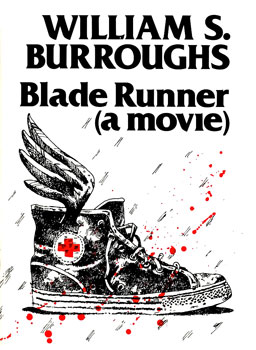
Blade Runner (a movie) is a science fiction novella by Beat Generation author William S. Burroughs, first published in 1979.
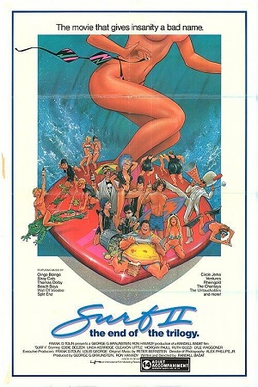
Surf II is a 1984 American comedy film written and directed by Randall M. Badat and starring Eddie Deezen, Linda Kerridge, Eric Stoltz and Jeffrey Rogers. The plot follows two dim-witted surfers attempting to thwart the plans of a mad scientist attempting to rid the beaches of surfers by turning them into zombie punks through chemically altered soda pop.
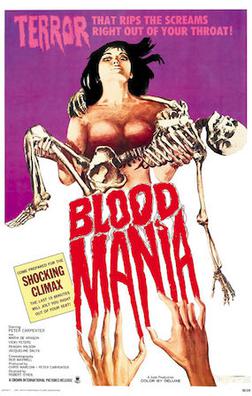
Blood Mania is a 1970 American horror film written by Peter Carpenter and Tony Crechales and directed by Robert Vincent O'Neil, and starring Carpenter, Maria De Aragon, Vicki Peters, Reagan Wilson, Jacqueline Dalya, and Alex Rocco. The film stars Carpenter as a doctor whose mistress, an heiress, murders her terminally ill father to help him pay off a debt.
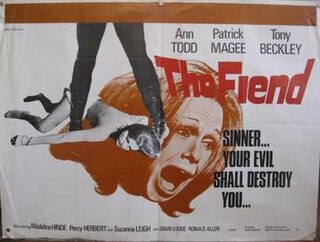
The Fiend is a 1972 British horror film produced and directed by Robert Hartford-Davis and starring Ann Todd, Tony Beckley and Patrick Magee. It was written by Brian Comport. The film is set against a background of religious fanaticism and, as with other films directed by Hartford-Davis, includes elements of the sexploitation genre of the early 1970s.

Uninvited is a 1987 American science-fiction horror film written, produced and directed by Greydon Clark and starring George Kennedy, Alex Cord, Clu Gulager, Toni Hudson and Eric Larson. The film primarily takes place aboard a luxury yacht owned by a criminal multimillionaire and bound for the Cayman Islands, whose passengers and crew are terrorized by a mutant cat.

Howard Brookner was an American film director. He produced and directed the documentary Burroughs about William S. Burroughs (1983), Robert Wilson and the Civil Wars on theatre director Robert Wilson (1986), and directed, co-produced and co-wrote Bloodhounds of Broadway (1989).
Vinegar Syndrome is an American home video distribution company which specializes in "protecting and preserving genre films". The company was founded in 2012 in Bridgeport, Connecticut by Joe Rubin and Ryan Emerson, who created it to restore and distribute old X-rated films that were lost or otherwise unavailable. Their catalog has since expanded to include other types of cult and exploitation films, including horror films and action films.

Welcome Home Brother Charles is a 1975 American blaxploitation film written and directed by Jamaa Fanaka. The film stars Marlo Monte as a wrongfully imprisoned man who seeks vengeance upon his transgressors using his prehensile penis. The film, which was shot on weekends over the course of seven months, was completed while Fanaka was a student of UCLA Film School.
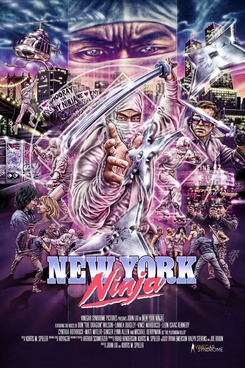
New York Ninja is a 2021 American action film written, directed by and starring John Liu. It was shot in 1984, but was not edited or released until 2021, when its footage was discovered and restored by the film preservation and home video distributor Vinegar Syndrome.
Gabriel Horn is an American actor and filmmaker. He has appeared in and produced or consulted on numerous television shows, documentaries, and independent films, including Tom Huckabee's Carried Away and the 2023 Christina Ricci/Steven Ogg science fiction film The Dresden Sun.
Tom Huckabee was an American film director, producer, fine artist, and screenwriter. Huckabee was also a musician and songwriter in the early US hard punk music scene of the 70s and 80s, primarily through his Austin Texas band known as the Huns, and then later via the band Re*Cords , a group once called, "an anarchic quartet, given to street performances and occasional scrapes with the law".
















